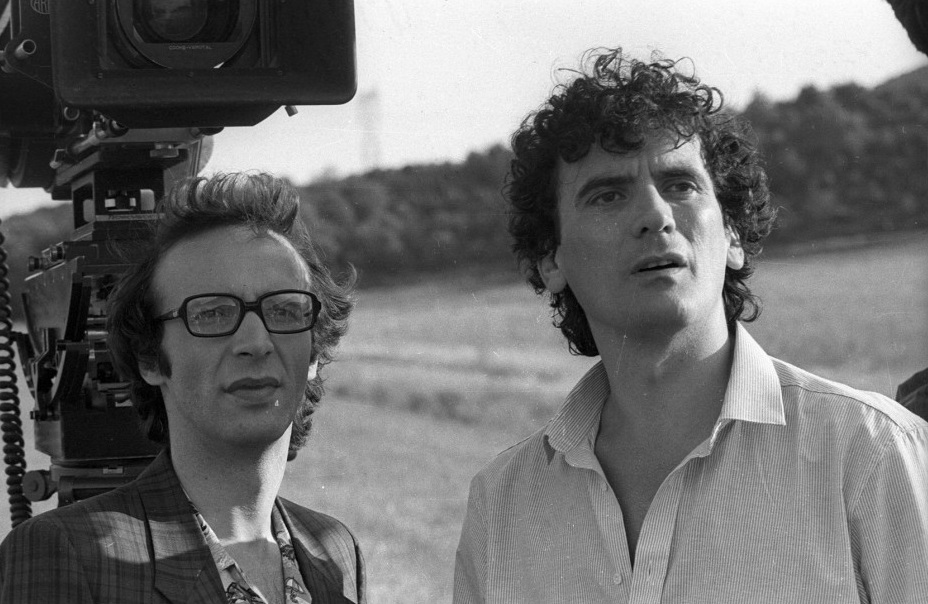The life of Massimo Troisi ended all too soon. But what a life he had, and what a gift he gave. Born in the small town of San Giorgio a Cremano near Napoli, Massimo seemed to have a singular mission in life, and that was to follow his heart.
Though his father worked as a train engineer, Massimo was enthralled with both acting and poetry. He began his career working as a cabaret showman as part of the trio “I Saraceni.” With his comedic timing, his facial expressions, and his remarkable acting, writing and directing skills, Massimo’s career flourished.
He went on to work in television and in films, gaining critical acclaim for a feature movie that he wrote, starred in, and directed, “Ricomincio da Tre.” This was followed by a series of films such as “Non ci resta che piangere” and “Splendor” with Marcello Mastroianni. In 1994, he combined both his passions for acting and poetry and gave the world perhaps his greatest labor of love: il Postino. In the film, Massimo played Marco who is in love with his Beatrice, performed by the ever stunning Maria Grazia Cucinotta. And there on a small island in Italy, he learned about love and metaphors and courage from the poet Pablo Neruda. In turn, we all fell in love with Massimo.
As his career soared, his health, however, deteriorated. As a teenager, he suffered from a bout of rheumatic fever which subsequently weakened his heart; that commanding heart which from the time he was a boy, he was so faithful in following. After scheduling for a new heart transplant many years later, he would later tell Il Postino’s director Michael Radford, “You know, I don’t really want this new heart. You know why. Because the heart is the centre of emotion, and an actor is a man of emotion. Who knows what kind of an actor I’m going to be with someone else’s heart inside of me.”
Massimo ended up keeping his heart. On June 4th, 1994, Massimo Troisi passed away, just twelve days after finishing Il Postino. He would never see the critical acclaim, the worldwide accolades, nor the Oscar nomination he would later garner. But somehow, I believe that all that stuff, that recognition, did not matter to him as much as the quality of his work and the love he so deeply felt for it.
This September, in the city of Napoli, Italy, a festival will be held in honor of one its own, Massimo Troisi. Recently, I sat down with its artistic director, Antonio Parciasepe, and together we spoke about the upcoming festival, the memory of one of Napoli’s finest stars, and how this gentle giant of Italian cinema made us all want to stop along a coast, get our feet wet, listen to the poems of Neruda, and take delight in living life to the fullest, as this young talented artist, despite everything, was able to do so well.
Gaya Lynn: June 4th is a date that touches the hearts of many Italians. Can you give us some thoughts as to why this date remains significant?
Antonio Parciasepe: June 4th 1994 marks the day of Massimo’s passing when we all began to miss the forty one year old actor, “the comedian of great emotions.” He was the last true Neapolitan “maschera.” His ultimately death sent shock waves not only throughout Italy, but perhaps, I believe, throughout the world. Not only because he was a young man and this in itself is tragic, but also because he was an artist who knew how to conquer the soul and the heart of so many with his sense of humility, and his uniqueness. A man, and an actor who gave all of himself for the sake of art, and in this sense, one could say he gave us his heart.
GL: What does Massimo Troisi symbolize for Italians?
AP: For Italians, Massimo Troisi represents hope, strength, talent and goodness. His personal story exemplifies all these traits. An unique individual who has bestowed his artistic heritage upon our culture…. Troisi with his art and his behavior which were both exemplary exemplified a progressive poet, an intellectual with honesty and values, all of which is difficult to find today. His revolutionary way of thinking, his interpretations, his will to better himself are principles which helped define him not only as a person but also as an artist.
No one could have imagined that his young man from a small town in Napoli-from San Giorgio a Cremano, the fifth of six children, the son of a train engineer-would go from nothing to being nominated for an Oscar. If his heart had not stopped that afternoon some twenty years ago, who knows to what heights he could have reached.
GL: This September, a memorial at a Festival will be in his honor. Can you tell us about that?
AP: Along with celebrating his memory, which will mark the twentieth anniversary of his passing, the Festival of art which will be head in September, will also celebrate Massimo’s positive outlook on life. We want to keep alive that willingness, his spirit and his commitment to better oneself. The festival is designed to help and offer guidance to young artists…today, more than ever, we need to look towards the future in the same light and perspective as Massimo did.
We will present a conference that will celebrate the spirit of Troisi, as we will offer activities, seminars, and meetings that will not just remember the past, but strive to a build a future. An event that will bring together, artists, professionals, students, entrepreneurs, and all those who share Massimo’s incredible vision. The Festival will take place between September 24th – September 28th and will literarily last the entire day from ten thirty in the morning till one in the morning the morning. It will be take place at the Stazione Marittima near the port of Naples. I am the festival’s artistic director, while the coordinator is Natascia Bonacci, the music director is Carmen Rizzello amd Cosimo De Luise from De Luise Agency is in charge of overall production and its organization.
GL: This year, the International Troisi Award will be coming to the states. And with this award, Americans will be able to not only watch his films, but also celebrate his life and his work. Can you tell us about this bilateral partnership?
AP: Massimo, both in his private life (especially with his health) and in his professional work, always had a strong connection with America. He is one of a handful of Italian artists continues to endure within the hearts of many Americans and their communities abroad. His heart stopped before going to America for the Oscars; that is why right now, I have the responsibility and job of continuing his legacy and carrying on his name. I dreams of bringing Massino to America by way of the “Triosi International Award,.” I feel that the man and the artist deserve the platform of this event where international stars and fans can pay tribute to the Partenopeo poet, director and actor. Massimo continues to live on as he is my guide and this is something I experience everyday.
Special thanks for the generous participation of Press Manager, Katya Marletta
For more information go to: http://owl.li/xBizc and http://owl.li/xBiAo





























